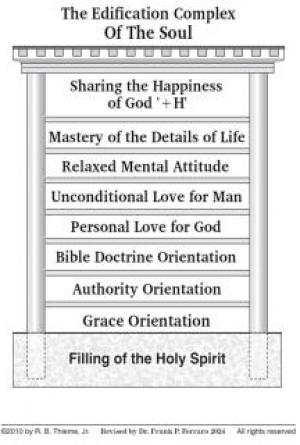The Old Testament and
Christian Ethics
It is strange how many
people – and even some educated Christian people – have a firm belief that it
is all but impossible to reconcile the Old Testament and the New. Their
perception is that there is a rigid dichotomy between Law and Gospel, between
judgment and love, so that the Old Testament can safely be rejected, apart from
being a document of historical interest, in favour of the New.
I will not waste time this
evening by trying to justify my conclusion that such a view is clearly
superficial. I suggest that we can take that as a starting point. What I want
us to look at is the actual key that will open the door. It is one thing to be
dismissive of the perceptions of others. It is another thing to come up with a
satisfactory explanation.
A reasonable starting
point might be that interpretation of Scripture by Scripture itself is a sound
basis; furthermore, all Scripture directly or indirectly, points to the person
of Jesus Christ. Let us also remember that God is a God of order and not a God
of chaos; that he works in love and power in his purposes of creation, judgment
and redemption of men. We do not have a God who says one thing and then
perversely says or does another.
Let me put this in another
way. Someone recently asked me the question as to which was greater, Jesus or
the Bible? Now, without intending to sound harsh or superior, I suggest that
this question came out of an immature understanding of the nature of God
himself. To the young man who asked me this question, God was not a God of
order but actually a God of chaos whose revelations were seen to be in
contradiction to one another.
My response to him was
along these lines: as Christians it is our faith and belief that Jesus is very
God and very man. As “very man” he is himself subject in his life to Scripture
as the Word of God as the Servant of God and as the chosen Messiah to whom the
Old Testament itself pointed with hope and expectation. As God’s Son and
Servant, Jesus was obedient and, indeed, he had to learn obedience. As my former
teacher, Professor Tom Torrance puts it (far better than I ever could!):
He learned obedience by that which he
suffered, for that obedience from within our alienated humanity was a struggle
with our [my emphasis]
sin and temptation; it had to be fought
out with strong crying and tears and achieved in desperate anguish and weakness
under the crushing load of the world’s sin and the divine judgment ... that we
might be redeemed and reconciled to him.
As such, he was subject to
Scripture (Scripture cannot be broken)
just as when he was a human child, he learned obedience to his parents and was
subject to them. But then there is another side to the coin for Jesus is also
God incarnate. He is King of Kings and Lord of Lords and, as such, he is the
Lord of Scripture itself. Accordingly, when Jesus interprets Scripture his
interpretation must always be taken as absolutely normative.
Those of you who remember
your church history will recollect that at the Council of Chalcedon it was
declared to be orthodox belief that Christ has two natures – human and divine –
but that these two natures were without change, confusion, division or
separation. This is, in fact, the real and eternal mystery of the whole person
of Christ, the fact that he was (and is) God and man, Lord and Servant, Priest
and Sacrifice. This, to me, is not only very important but also highly relevant
to our study today. I make no apology for appearing to labour the issue.
In other words, when we
look at Jesus’ interpretation of Scripture we must not yield to the temptation
of asking whether he was interpreting it in a human or divine way, for to do
so, is to drive a coach and horses through his finished person and work. I do,
of course, accept that Jesus born at a particular time in human history and, as
a man, speaks within the received knowledge and culture of that time. If we can
keep all of this in mind, then it is not difficult to see the whole of Scripture
– Old and New Testaments – as the wonderful unfolding of God’s great and mighty
plan of creation, redemption and sanctification.
If we understand and
believe that Scripture really is a
unity, then we will not have the same problem with the so-called purple passages
of the Old Testament. And let us remember that, even if this makes us uncomfortable,
there is also quite a lot “Hell and damnation” in the New Testament!
Let us look at an example:
suppose you were asked to read from Psalm 137 which, as you will remember,
begins with the famous words: By the waters
of Babylon we sat down and wept when we remembered Zion. So far so good!
But you will also remember that the same Psalm ends with the less famous words:
Happy shall he be who takes your little
ones and dashes them against the rocks. Now, the question I want to raise
with you is – would you after reading right through that Psalm in church,
including the ending, be able to say Amen
and may God add his blessing to this reading of his Holy Word?
I hope I do not sound
arrogant when I suggest that I probably could now, although I am not
suggesting it would come easily. Certainly, as a younger Christian I would not
have been able to do so. I had a mixed up view of revelation, of the meaning
and purpose of Scripture, of the person of Christ and even of the nature of
God. It is when the penny dropped that Scripture really is a unity that I
began to see the way through the mist. I understand now that in so many
respects God’s revelation is progressive and that, although the plan of
redemption unfolds, grows, blossoms and flourishes, it is not self contradictory
since (as already stated) God is a God of order, not chaos, who moves
steadfastly from promise through judgment to fulfilment.
Well, some of you may be
wondering when this young fellow
is going to climb off his theological pedestal and get down to some more basic
examples. In particular when, if ever, is he going to get on to the subject of Christian
ethics? If we look at the New Testament, we see that many of the great
spiritual and morals issues were put to Jesus by both his friends and his enemies,
for entirely different reasons; but they all had to be faced in the same. One
thing on which his friends and enemies agreed was that if they wanted to know
God’s will, they must search the Scripture.
But, in the eyes of Jesus,
some of those he encountered tended towards one fatal mistake. The mistake was
not that they applied the Law of God too strictly but that, in fact, they had
left undone its weightier matters.
They literally carried
Scripture around in their hands, in other words, and they revered it and held
it in great esteem; yet they did not apply it to their hearts. Therein lay the
problem. Do not think that I have come to
abolish the law and the prophets.
Jesus without doubt taught
his disciples that the Law had been given to be obeyed both in letter and in
spirit. The law and the prophets were
until John; since then the good news of the gospel is preached and everyone
enters it violently. But it is easier for heaven and earth to pass away than
for one dot of the law to become void.
So, it is clear that Jesus is not an
antinomian. He did not, as some people perceive, consign the Old Testament to
the dustbin of history. Saint Paul uses the analogy of the Law being a
schoolmaster to bring us to Christ.
Also, Jesus is not
revolutionary in the sense that some today would like to see him, as someone
who overturned everything in the old order and generally behaved like a bull in
a china shop. The truly revolutionary aspect of the life and work of Jesus was
that he was able to confront his enquirers and opponents on their own ground.
He was able to show them that although they believed (no doubt sincerely in
many cases) that they were obeying the Word of God in every detail, in fact
they were only obeying the letter of the law
and not the letter and the spirit. It is a case of “both and” and not
“either or”.
Now some people have
suggested at various times that Jesus actually said very little that was new.
Sometimes that has been said in order to shock. The trouble with this statement
is that it is half true and half truths can sometimes be more misleading than
untruths. However, it is certainly both true and clear that Jesus spoke and
acted using Old Testament language and concepts. It is said that the New
Testament contains over six hundred direct quotations from the Old, many of
them in the recorded speech of Jesus in the Gospels. If Jesus had not referred
frequently to the Old Testament, I suggest that the early church would not have
done so. It is also said that there are over a thousand clear allusions in the
New Testament to the Old.
You remember that famous
occasion when one of the Pharisees, a lawyer, came to test Jesus. Which is the greatest commandment in the law?
In response, Jesus stated: You shall love
the Lord your God with all your heart and with all your soul and with all your
mind. This he said is the greatest commandment.
Now, was this something
new and revolutionary? Was this at odds with the teachings of the Old Testament?
Well, if you turn to the Old Testament you would find that this is a direct
quotation from
the Law of Moses as recorded in the book of Deuteronomy ...you shall love the Lord your God with all your heart, and with all your
soul and with all your might. Indeed the context (to me) seems clear,
namely that it is a summary of very important verses that have preceded it,
including the Ten Commandments.
So, this first quotation
was a direct quotation from Scripture itself. Then Jesus goes on to a second commandment
and we can sense that it too is crucial but also that it depends on the
previous commandment, which is the greater. The second commandment is: You shall love your neighbour as yourself.
Again, if you were to turn to the Old Testament
you would find these identical words: On
these two commandments (said Jesus) depend
all the law and the prophets.
Notice then that Jesus was
not saying that these two quotations entirely summed up the entire spirit
of the Law in the Old Testament. What he is saying is that they give us
the basic essential message of the Old Testament. The law still stands. The Law
has not been abolished.
There is a very
interesting saying in the Sermon on the Mount
where Jesus says - You have heard it said
“Love your friends, hate your enemies.” He then goes on to tell the crowd
that they should love their enemies and pray for those who persecute them. In
fact Jesus is referring to a popular (at the time) misquotation from the
Book of Leviticus.
People thought that their Scripture
said one thing, whereas in fact it said quite another. Misquotation of
Scripture is nothing new! It is as popular today as it was in the time of the
New Testament.
However, although the
Gospel could be seen in the Old Testament, it was veiled in sacrifice, type,
symbol and allegory until the coming of the One who was promised. It is
certainly true that Abraham was justified by his faith
but it was not yet (obviously) a fully developed faith in God through Jesus
Christ. Now, with the coming of Christ the Gospel is not veiled in the same
sense: it is now only veiled
to those who are perishing.
Having then agreed that
the New Testament in no way abolishes or belittles the Law of God – but,
indeed, that Jesus interprets it very strictly in comparison with the Judaism
of his day – let us be careful not to go in the other direction. What I mean is
that there could be temptation to see the New Testament imposing on us a higher
Law as a means of grace. Now, we can certainly say that the New Testament
applies the Old Testament Law but, most important of all, it gives us the Gospel
of Jesus Christ. The Law is not there just to be passed over; it is there to
lead, convict, instruct and lead us to Christ, foretold in the prophets, and to
the New Covenant mercies of God.
Having laid this
foundation without (I hope) labouring too many points, I want to pass on the
second and briefer part of this modest paper. I have not forgotten that we are
supposed to be looking at some of the problems of Biblical ethics as we
understand them. Now there are almost as many kinds of ethics are there are
pebbles on the beach – naturalism, idealism, existentialism and what have you –
yet for the Christian these alone are not good enough systems. Their first
great fault is that are all subjective to some degree or another. To be fair, I
doubt if there is really any system of ethics that does not include some degree
of subjectivism. Maybe that is no bad thing, since it would be very rigid to
deny that circumstances can alter cases. Not everything can be seen in black
and white terms.
For the Christian ethics must
be something much deeper and longer lasting and, I suggest, more closely
related to Scripture. The Christian when he is thinking of what God is like
does not (or should not) start with man and then magnify that image 1,000 times
to get to the finished result (although I suppose we all do that to some
degree). That is man centred and not God centred thinking. Also, it is only
fair to say that there is a very real difficulty in knowing how far Christian
ethics are meant to be applied to non-Christians. Are they rules for Christians
alone whilst society can do as it pleases?
Of course, whatever
tradition we belong to, it is the case that much of the law and the moral code
of Scotland developed in the way that it did because it was a Calvinist
society. In Scotland, the church has never been part of the state or even
connected with the state
but in our Calvinist culture, the church is (or was) part of society.
Thus, even today, a great deal of what we take for granted in Scottish life and
culture has been moulded by a strong Christian influence. There are signs that
this process of influence has weakened in recent years and will continue to do
so. I also suggest that our debt to the influence of Christian teaching and values
will become much more clouded and may even be denied.
In our own time, society
has become more fixated on the highly elusive concepts of “good”. Well, good
cannot be bad, can it? The difficulty is to know which standard to apply. “Good”
is an almost meaningless word unless it has some point or points of reference.
What, for the Christian, is the ultimate concept of “good”? Discuss! That could be the basis for a whole
year of Graduates’ Fellowship meetings and even then the subject would not be
exhausted nor would everyone be in agreement. At the risk of seeming
over-simplistic I would suggest that the ultimate good is obeying God and
seeing God’s will being done. If God wills something, then because God cannot
be other than he is – all just and all loving – his purposes cannot be other
than good.
If we are shocked by the
command of God to go and slaughter such-and-such a tribe (and I confess that I
find this really quite difficult to handle) then possibly we are not allowing a
truly sovereign God to confront us. I say that more to myself than anyone else.
God does not act in accordance with some standard laid down by men. He acts
according to his own standards of justice, love and mercy.
Thus as Christians, our
primary concern in ethics is to discern God’s will and the truly objective way
of doing so is to look in Scripture. But that is easier to say than to do
because there are many issues on which Scripture is not as clear as we might like
it to be.
The Bible is not a
collection of proof texts that gives us simplistic answers to every possible
problem under the sun. It is so easy to fall back into the legalistic way of
thinking and resort to arbitrary text jabbing. We can so easily forgot that we
live in the days after Pentecost. We can easily forget too that the Christian
Gospel is a Gospel of freedom and not of bondage. I suggest to you that even
two thousand years on from the events of the New Testament, we as the church still
are unsure about the true bounds of freedom. Freedom, to me, also means using a
wee bit of good old fashioned common sense. To suggest that the will of God is
antithetical to common sense is surely perverse.
Paul points out that he is
free to eat meat offered to idols, as the idols have no reality. But he is also
aware that he must consider the feelings and sentiments of others.
Under the new order, the law of God still stands and it is perfectly true that
any society that does not live according to its own laws is in a statement of
lawlessness. But there is now a freedom that never existed under the old order.
It is not legalism in disguise. We are given a choice and it is a positive
choice.
The evangelist D L Moody
was once asked why he never went to the horse races. His reply was that he went
to the races as often as he chose; he simply made a free choice not to.
Even as Christians, we are,
not unreasonably, fearful of the “must”, “should” and (especially) “must not”. The
law, whether it is Old or New Testament, reminds us of the high standards of
God. But in the pages of the New Testament we encounter a Jesus who was very
much aware of how hard it is for ordinary people to live up to these standards.
If anyone understands the ways of ordinary people, it is God in the person of
Jesus Christ. That is what is so unique about the Christian message.
Let me put this in another
way; since Jesus was himself the perfect man who did not break the law but
fulfilled it, there is the distinct possibility of feeling a degree of discouragemen







